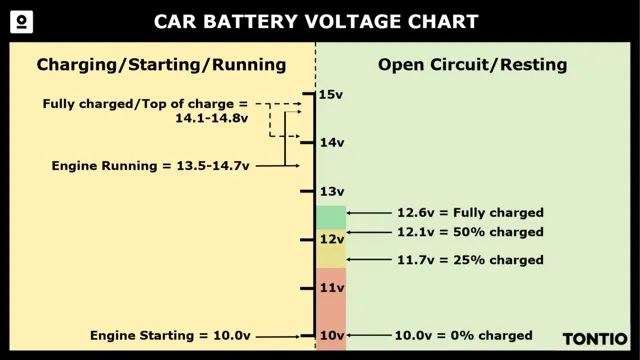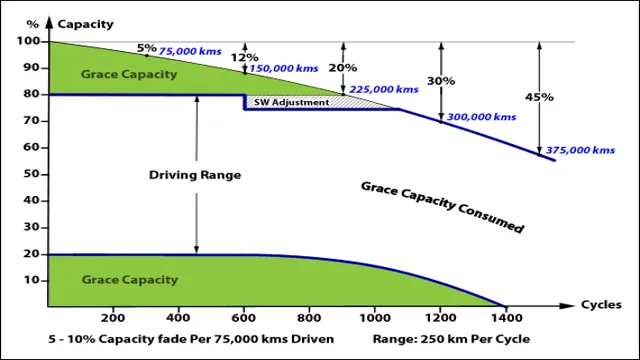Exploring the Voltage of Electric Car Batteries: How it Affects Performance and Range
Electric cars are taking over the automotive industry, and for good reason. Not only are they environmentally friendly, but they also come with numerous benefits such as reduced fuel costs, less maintenance, and an overall smoother driving experience. One of the essential components of electric cars is the battery that powers them.
Electric car battery voltage is a crucial factor that determines the car’s speed, range, and power output. The voltage of an electric car battery is measured in volts (V), and it determines how much energy the battery can store and deliver. A higher voltage means that more energy can be stored in the battery, which translates to more power and a longer range.
Electric car batteries typically range in voltage from 200-800 volts, with the most common being around 400 volts. Understanding electric car battery voltage is vital, especially if you are considering buying an electric car. You need to know how to interpret the battery voltage rating to determine how much power the car can deliver and how far it can go on a single charge.
In this blog, we will delve deeper into electric car battery voltage, its significance, and how it affects the performance of electric cars.
What is electric car battery voltage?
Electric car battery voltage refers to the amount of electrical energy that the battery can supply to power the vehicle’s electric motor. The voltage of an electric car battery typically ranges between 200 and 450 volts, with some models capable of up to 800 volts. The higher the voltage, the more energy the battery can supply to power the vehicle, allowing it to travel further on a single charge.
Electric car manufacturers have been working to increase the voltage of their batteries in order to improve vehicle range and performance. Additionally, higher voltage batteries can be charged faster, reducing charging time and making electric cars more practical for daily use. Overall, understanding electric car battery voltage is important for anyone interested in purchasing an electric car or working with electric vehicle technology.
Explanation of voltage in batteries
Electric car batteries operate at varying voltages, but most models typically range from 200 to 400 volts. The voltage of a battery is determined by the number of cells inside it, and the cells influence the overall power and energy capacity of the battery. Essentially, the more cells a battery has, the higher its voltage will be.
Higher voltage batteries are generally more efficient than lower voltage ones, delivering longer ranges and faster charging times. It’s also important to note that electric car batteries are different from traditional car batteries – they are designed to tolerate frequent charging and discharging without significantly degrading their capacity and performance. The voltage in a battery is crucial to fueling an electric car and understanding it is vital to optimizing its performance.

How much voltage do electric car batteries have?
Electric car batteries are the heart and soul of modern electric vehicles, and understanding their voltage is crucial to understanding how these cars operate. Typically, electric car batteries have a voltage range of 350 to 400 volts, with older models having a lower voltage range of 200 to 300 volts. The voltage of electric car batteries is important because it determines the amount of power the car can generate and how fast it can go.
Higher voltage batteries can generate more power and help electric vehicles reach high speeds quickly. However, this also requires more advanced charging infrastructure and higher levels of safety features to protect against accidental battery explosions. Ultimately, the voltage of electric car batteries is just one of many important factors that go into the engineering and design of modern electric vehicles.
As technology progresses, we can expect to see even more advancements in electric vehicle batteries, including increased voltage ranges, longer battery life, and more efficient charging methods for sustainable transportation.
Comparison of popular electric car battery voltages
Electric car batteries vary in voltage, but the most popular ones typically range from 200 to 400 volts. For instance, the Nissan Leaf battery has a voltage of 360 volts, while the Tesla Model S ranges between 375 to 450 volts. The Chevrolet Bolt, on the other hand, has a voltage of 350 volts.
But why does voltage matter? In essence, voltage determines how much power the battery can produce, which affects the speed, acceleration, and overall performance of the car. Additionally, the voltage also plays a crucial role in how quickly the battery can charge and how far it can go on a single charge. It’s important to keep in mind that while higher voltage may translate to better performance, it also comes with safety concerns, as higher voltage poses a higher risk of electric shock.
It’s up to each automaker to find the right balance between power and safety when designing electric car batteries.
Range and efficiency implications of different voltages
Electric car batteries can have various voltages depending on the manufacturer and model. Most electric vehicles (EVs) have batteries with voltages ranging from 200 to over 400 volts. The voltage affects the range and efficiency of the EV.
A higher voltage means a higher range, as the battery can store more energy per unit of weight. However, a higher voltage also means higher energy loss due to heat generated from the battery’s internal resistance. Hence, EV manufacturers use a tradeoff between voltage and efficiency to optimize the vehicle’s performance.
Furthermore, a higher voltage requires a more complex and costly electronics system to maintain the battery’s voltage levels safely. Overall, the electric car batteries’ voltage affects the range, efficiency, and complexity of the vehicle’s electronic system.
How is electric car voltage affected by charging?
Electric car batteries voltage is directly related to the charging process. When an electric car is connected to a charging station, the voltage of the battery will increase. However, the rate at which the voltage increases depends on the type of charging station being used.
Level 1 charging, which typically uses a standard household outlet, will increase the voltage at a much slower rate than Level 2 charging, which uses a specialized charging station. Level 3 charging, also known as DC fast charging, will increase the voltage at a much faster rate, allowing the battery to charge up to 80% in as little as 30 minutes. It’s essential to pay attention to the recommended charging rate for your specific vehicle, as charging too quickly or too slowly can have a negative impact on the battery’s overall life.
Additionally, cold temperatures can affect the battery voltage by slowing down the charging process, so it’s important to keep your electric car in a warm garage or parking garage during the winter months. Overall, understanding how the charging process affects the voltage of your electric car battery is essential for maintaining the battery’s efficiency and longevity.
Overview of charging methods and their impact on voltage
Electric car voltage is impacted by various charging methods. When you charge an electric car, the car’s battery’s voltage will increase, providing more range and power. The faster you charge your car, the more voltage it will typically receive.
However, these fast-charging methods can lead to a shorter battery lifespan over time due to the heat produced during the charging process. On the other hand, slower charging methods, such as home charging, typically provide a lower voltage, but they are easier on the battery and will extend its lifespan. As a result, it is essential to use a charging method that is appropriate for your car and your driving needs.
Overall, it is critical to understand the impact of different charging methods on electric car voltage to ensure that you maintain your car’s optimal performance and longevity.
Common charging mistakes and their effect on battery voltage
Electric car owners can sometimes make common charging mistakes that can negatively impact their vehicle’s battery voltage. One such mistake is leaving the car plugged in for too long. When an electric car’s battery is fully charged, leaving it plugged in can cause the voltage to rise to unsafe levels.
This can trigger a protective system that shuts off the charging process and can even damage the battery. Another mistake is using an incompatible charging cable or charger. This can lead to low voltage, slow charging, or even overheating, which can further reduce the battery’s overall health and capacity.
It’s important to always use the manufacturer-recommended charging accessories and follow the recommended charging times to ensure proper battery health and performance.
Conclusion
In conclusion, electric car batteries are like the spicy seasonings that bring flavor to your favorite dish. They’re what charge up your electric car and power it forward, and the voltage is the kick that makes it all possible. So, just like a chef carefully chooses the right amount of spice, electric car drivers need to make sure their batteries have the right voltage to keep their ride running smooth and zesty.
“
Summary of key takeaways on electric car battery voltage
Electric car battery voltage is affected by charging in multiple ways. One of the factors that influence it is the charging speed, which can affect battery temperature and ultimately impact voltage. When charging at high speeds, the battery can become hot, leading to a reduced voltage and, worse, damage to the battery.
Additionally, charging to full capacity can also impact the voltage. Lithium-ion batteries typically have a maximum voltage level of 2V per cell, and exceeding this level can negatively affect the battery’s lifespan and performance over time.
Therefore, it’s important to balance charging speed and capacity levels to avoid damages and maintain optimal electric car battery voltage.
FAQs
What is the average voltage of electric car batteries?
The average voltage of electric car batteries ranges from 200 to 400 volts, depending on the vehicle model.
Can electric car batteries be charged with a standard voltage outlet?
No, electric car batteries require higher voltage charging, usually with specialized charging stations.
How long does it take to fully charge an electric car battery?
The time it takes to fully charge an electric car battery depends on the charging speed and battery capacity. On average, it takes 4-8 hours to fully charge an electric car battery.
What is the lifespan of an electric car battery?
The lifespan of an electric car battery varies depending on factors such as usage, charging habits, and environmental conditions. However, most electric car manufacturers offer battery warranties of 8-10 years or 100,000-150,000 miles, whichever comes first.






